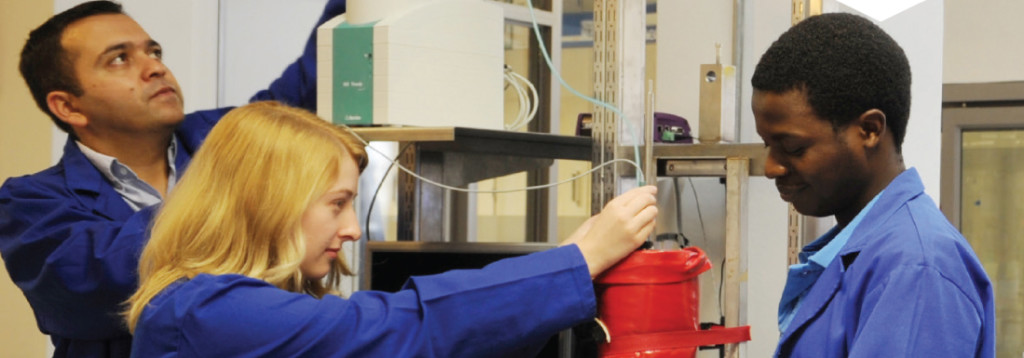Growing the next generation of academics has been part of the Research Office’s mission since its inception. Obtaining a doctorate is a challenge in itself that requires considerable support; for those embarking on an academic career trajectory after that, some research and publication experience on their own do not guarantee success. Not only do academics need to be supported to establish themselves (from being “emerging” to “established” researchers), they also do better if they are supported in the various ventures that contribute to making a research-intensive university, including writing books, successfully applying for research grants and publishing in international journals.
THE FIRST STEPS
As a research-intensive university, UCT has committed itself to growing its postgraduate student body. With attractive scholarship packages, a targeted recruitment campaign in certain sectors, a postgraduate prospectus, and an increase in the number of international partnerships and joint PhD programmes, UCT has had an increase of 16% in its 2014 postgraduate applications. UCT’s aim to increase and strengthen the profile of its postgraduate students and postdoctoral fellows entails a necessary expansion of its research enterprise. This reciprocal link manifests itself in a number of ways. Postgraduate training necessarily involves research training under the supervision of an experienced researcher. Especially at doctoral level, supervisors take on students who are working in the supervisor’s area of expertise and who are part of the research team that further develops particular fields of study. Moreover, supervisors encourage doctoral students and postdoctoral fellows to engage with key contributors in the local and international research community. Productive researchers in most of UCT’s flagship programmes apply for research grants that include scholarships for postgraduate students and fellowships for postdoctoral fellows to help carry out the research. These postgraduates and postdoctoral fellows are immediately part of a research team, a project with a structure, deadlines, collegial networks and funding. Research projects typically produce research publications. The postgraduate and postdoctoral fellows’ contribution to the project is acknowledged in co-authorship, which strengthens their own academic profile while increasing the university’s publication output. Technology and the ease of global connections have internationalised research at UCT. As a research-intensive university, it has research teams with robust international partnerships and exchanges of researchers and postgraduate students with the goal of expanding, enriching and embedding research so that it can maximise actual advancement and social improvement.
To support UCT’s growing postgraduate and postdoctoral communities, the Office for Postgraduate Studies and the Postgraduate Funding Office participate in overseeing specific programmes for postgraduate students and postdoctoral fellows. Two of these partnerships are the Carnegie Corporation’s Growing the Next Generation of Academics in Africa (see page 24) and the MasterCard Foundation’s Developing First-Generation African Professionals.
MCF: Developing First-Generation African Professionals
In 2013, UCT was awarded a C$23 million grant by the MasterCard Foundation (MCF), Canada. The project aims to provide educational and professional development opportunities to undergraduate and postgraduate students from South Africa and other countries in Africa. The recruitment of international students who come from economically disadvantaged backgrounds in Africa makes the MCF Scholars Programme both different and challenging. The MCF Scholars Programme allows UCT to seek out, recruit, mentor and educate this pool of talent and support grant recipients into post-degree employment, entrepreneurship or higher study. Since funding programmes for African-nationality graduates and undergraduates are not frequently available, this project helps to close a critical gap in terms of access and increases postgraduate enrolments. The MCF Scholars Programme at UCT helps promising young people make the transition from beneficiaries to benefactors, preparing them with the necessary values, knowledge, skills and leadership to fuel economic and social progress across Africa.
Academic and professional skills development opportunities
Many top international institutions are seeking formal partnerships with UCT. As part of these global partnerships, the university promotes co-badged qualifications and joint postgraduate programmes that entail student and staff exchanges, in addition to co-supervision of research projects. It is no longer enough for master’s and PhD graduates to be experts in their fields; they are also expected to have a portfolio of professional skills that can be transferred to the workplace. In order to strengthen these initiatives in the postgraduate sector, opportunities for academic and professional skills development have expanded. Drawing on findings from employers about required graduate attributes and on supervisors’ and students’ needs, a range of seminars, workshops, retreats and massive open online courses (MOOCs) are on offer to postgraduates and postdoctoral research fellows. It is anticipated that more than 2 000 postgraduates will attend these sessions in 2014. Given the high attrition rates of online courses, the MOOCs are supplemented with weekly on-campus face-to-face group meetings, led by postgraduate students or postdoctoral fellows who are employed as facilitators. This helps promote student retention and completion rates, while facilitators at the same time gain professional experience in tutoring. After completing the MOOC, facilitators are issued with a UCT certificate of recognition as part of their professional development and for inclusion in their curriculum vitae.
EARLY CAREER SUPPORT
Structured, institution-wide support for early career academics at UCT goes back to the beginning of 2003 with the establishment of the Emerging Researcher Programme (ERP). In the intervening decade, the extent and nature of the support has grown, with a simultaneous refinement of initiatives.
Individual and group support
For many early career academics, the blend of ongoing individualised mentoring and a structured seminar and workshop programme has been invaluable for their development as researchers. This constitutes the backbone of UCT’s support to early career researchers. In response to changes in the national and global research environment in 2013, the ERP honed its focus on developing grant-writing skills, with corresponding assistance to researchers in accessing information on funding opportunities for internal grants and those available through the National Research Foundation and the Research Professional Africa funding platform, for example. During 2013, 90 early-career researchers participated in grant-writing seminars and workshops and a similar number is anticipated for 2014. A distinctive feature of the support offered is a capacity building exercise in which researchers are invited to submit draft proposals for review and discussion, refining them in line with funder requirements before final submission. A significant part of early career support at UCT is the development of writing and publishing skills. In line with this, 13 departmental writers’ workshops were held during 2013, with a total of 162 people attending. Participants, coming to workshops with draft articles, chapters or PhD proposals, have the opportunity to present their work and obtain feedback on the first day, thereafter working to implement recommendations and complete articles.

Senior academics are available for consultation for the duration of the three-day workshops, and participants are tracked all the way to publication. Along with one-on-one interaction with researchers and a seminar and workshop programme to develop research skills, graduate supervision training continues to be a core element of early career support. Biannual workshops are held in both the science and social science/humanities streams. A feature of many of the supervision workshops is that the groups comprise both supervisors (of master’s and PhDs) and students (PhDs), creating an interesting and fruitful dynamic between student and supervisor perspectives.
Interdisciplinary exchange
A number of serendipitous opportunities have emerged from these structured support initiatives. Significant among them is the disciplinary mix among participants in many events, facilitating cross-disciplinary conversation both in formal sessions and in less formal spaces, such as over meals. The effect of this is twofold. First, from early on in their careers, researchers are exposed to other disciplinary perspectives – an opportunity that is rare in traditional discipline-based institutions. Second, a number of cross-disciplinary collaborations have been initiated as researchers discover areas of common interest with potential for joint projects and publications. Throughout 2013, the programme facilitators developed a honed appreciation of the value of such encounters and have encouraged these interactions, particularly since the current global thrust towards interdisciplinary collaborations is an increasing imperative for funders.
Upcoming publication
In 2007, Professor John de Gruchy and Dr Lyn Holness published The Emerging Researcher, a book reflecting on the birth and early years of the ERP. This volume, which focused on the content of the ERP’s seminar and workshop programme, was widely distributed and used – at UCT itself, within South Africa, and beyond national borders. At least two factors indicated the need for a second book: the expansion and refinement of the programme during the years since the first publication, and far-reaching changes in the local and global research environment, creating unprecedented challenges for researchers, particularly those in the Global South and notably in Africa. In response to this situation, Dr Holness has produced a second book, addressing new challenges and accommodating the broadened scope of research development strategies offered at UCT. Addressed to both emerging researchers and their mentors, the new book is due for publication early in 2015.
MID-CAREER SUPPORT
The Programme for the Enhancement of Research Capacity (PERC) supports mid-career and established researchers and aims to enhance their capacities and help them to step up to recieve world recognition in their respective research fields. The programme uses seminars, workshops, grants and one-on-one consultative interactions to boost the research productivity and confidence of staff. PERC operates as a portal through which academics can engage the services that are offered by the Research Office in supporting mid-career researchers. It also proactively catalyses research, converting some of the university’s strategic research goals into practical projects, particularly in the areas of interdisciplinary work and African collaboration. One example of this is Ed February’s work (see page 34).
Promoting networking is a key element of PERC. For instance, Professor Hanri Mostert (Department of Private Law) received a PERC grant to assist with hosting, in co-operation with the Groningen Centre for Law and Governance, a colloquium on “Rethinking the Public Interest in Expropriation Law”. A number of countries were represented at the colloquium, including South Africa, the Netherlands, the USA, Canada, the UK, Israel, Poland, Italy, Germany, Australia and Ireland. Professor Mostert, together with Dr Ada Odor (Centre for Comparative Law in Africa), is working on a project to compile five-country studies of mineral law, drawing together colleagues from Botswana, Ghana, Namibia, South Africa and Zambia. Dr Ellen Hurst (Humanities Education Development Unit) received a PERC research grant to host a workshop on “Urban Youth Language in Africa”. Delegates presented a wide variety of topics, ranging from languages in the slums of Addis Ababa and taxi ranks in Bulawayo to comedies, music and plays in Kampala. The use of urban youth language in the media and in hip-hop music came under the spotlight, alongside the language of university students in Côte D’Ivoire, Algeria and Nigeria. The workshop was also attended by scholars from the Netherlands, the UK and the USA. They included Professor Maarten Mous from Leiden, an expert on several East African languages, Associate Professor Peter Githinji from Ohio, who works on Sheng from Kenya, and Associate Professor H Samy Alim from Stanford, who is interested in hip-hop practices. Associate Professor Tom Franz (Biomechanical Sciences Cardiovascular Research Unit, Chris Barnard Division of Cardiothoracic Surgery) served as a PERC fellow in 2013 and 2014. In this position he forged links between the faculties of Engineering & the Built Environment, Health Sciences and Science, as he contributed to the development of interdisciplinary research at UCT. One of his projects resulted in a workshop on cell mechanics and mechanobiology. The event was jointly funded by the British High Commission in Pretoria, the Technology Innovation Agency and UCT. The speaker consortium hosted speakers from a number of institutions and countries, including the UK, Germany and Spain. The event enhanced international collaborations and enabled South Africa and the UK to access high-value multilateral funding for interdisciplinary research and innovation to advance understanding, prevention and treatment of chronic diseases. It also provided the opportunity for many junior staff and postgraduate students to engage with cutting-edge international scholarship.



